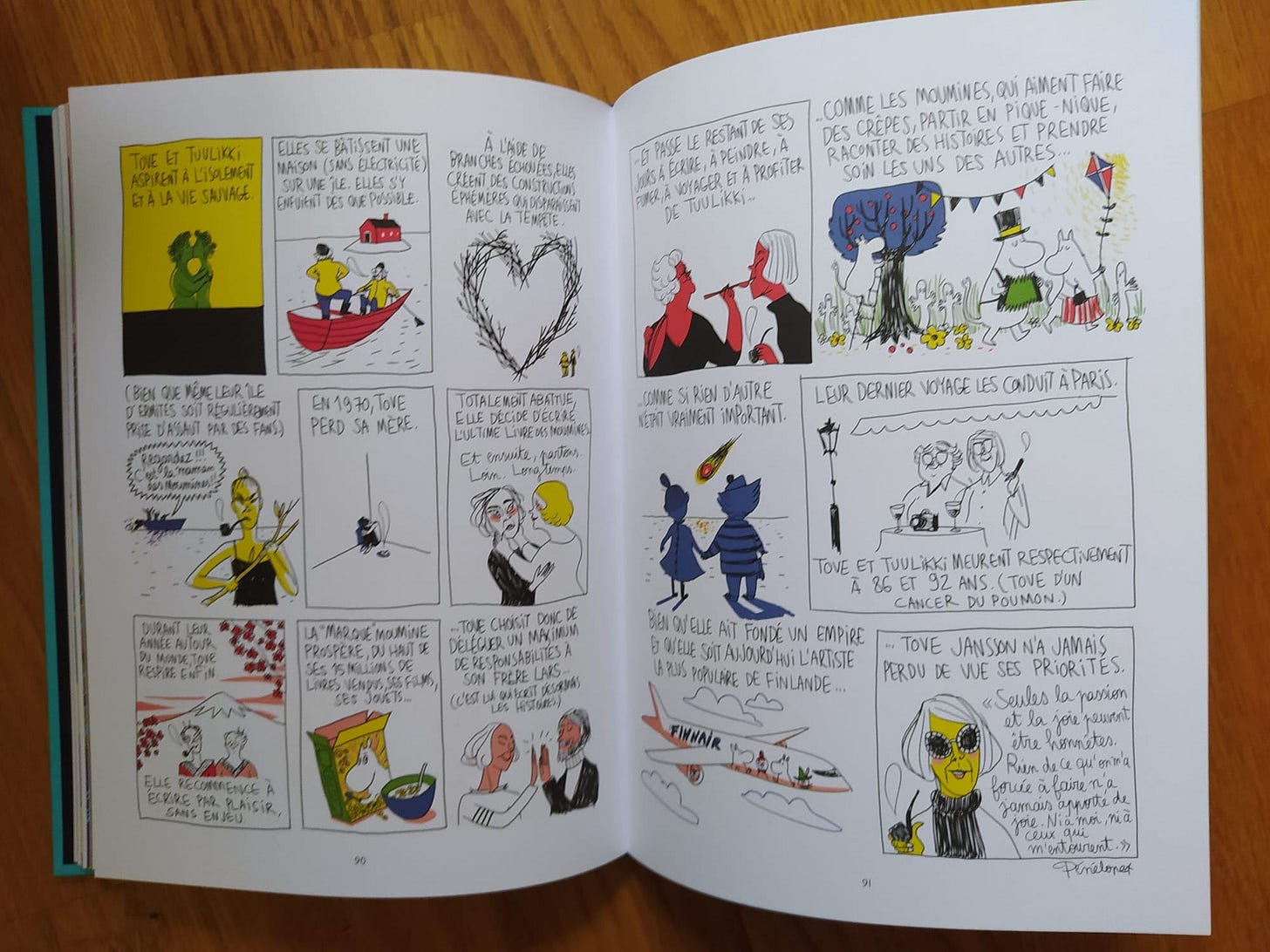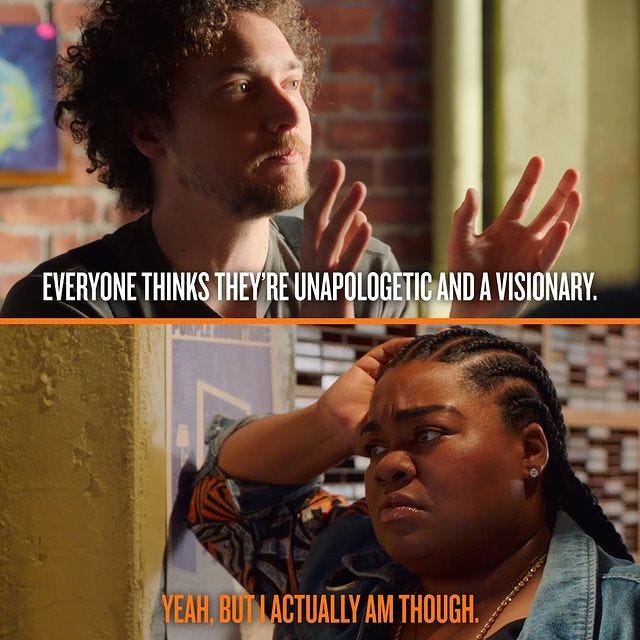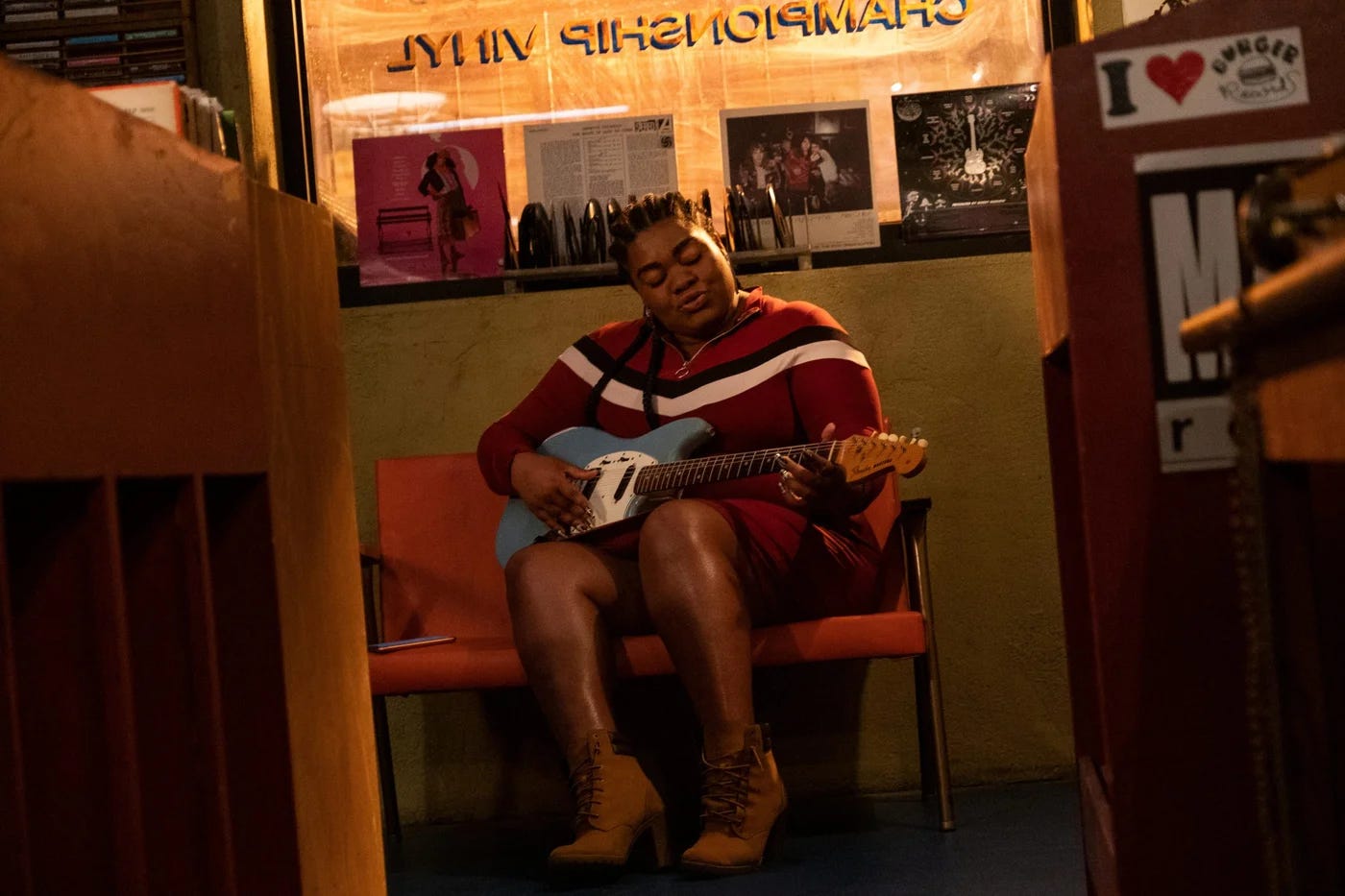#40: Three Things that got me thinking
🔥Brazen women + 🎸High Fidelity + 🦟malaria workers
Bonjour,
These Three Things are coming a day early because I have an extra guest post for book worms this week. So I’ll send you three e-mails on Monday, Wednesday and Friday. SQUEE!
Let’s go.
1. Passion and joy
Here’s a quote by illustrator and author Tove Jansson, who created the Moomins children’s book series:
Only passion and joy can be honest. Nothing I’ve been forced to do has ever brought me joy. Not to me, not to those around me.
Jansson is one of the women portrayed in Pénélope Bagieu’s album Culottées , a collection of graphic biographies of gutsy women who live(d) true to their desires and values (and passion and joy), in defiance of unjust laws; unfair expectations; violent dictators; etc. etc. Some women are well-known; others I’d never heard about. Some died centuries ago; others are alive.
Each of their life stories is told in a few pages full of wit and beauty.
Culottées was translated as Brazen: Rebel Ladies who Rocked the World in English. Below’s a short clip from the Culottées animated series, broadcast by French public TV channel France 5.
2. Spoiler alert
I finished watching High Fidelity, which is as entertaining and cool as you’d expect from a rom com series with Zoë Kravitz as the main star and executive co-producer.
The series follows the love life—past and present—of Rob/Robyn (Kravitz), a music fanatic and record shop owner in Brooklyn, scarred by a sad breakup1.
But I’m more interested here in Rob’s friend and employee Cherise (Da'Vine Joy Randolph). Equally obsessed with music, Cherise speaks at length about the artists she admires, and about her own talent and grandiose ambitions. But she doesn’t seem to actually make music—or, if she does, doesn’t ever share her songs.
Still, Cherise is so loud about her extraordinary potential that it becomes a sad joke.
In the series’ last episodes, Cherise’s demeanour changes gradually. She takes on an extra job to save up money for a guitar—a Fender Mustang in Daphne Blue—which, at first, sounds like another distraction. (Like when I buy stashes of fabric and cute haberdashery, but my poor sewing machine rarely leaves her box.)
Here’s what Cherise says as she shows her co-worker Simon a picture of the guitar of her dreams:
This, this is an instrument of creation. […] Like, I have the sounds going off in my head, all day long, songs for days. This will allow me to play them songs and I gotta be writing them songs like (she grunts).
As she explains this, Cherise actually sounds and looks pained, and I found myself finally rooting for her and her unformed creations.
—SPOILER BELOW— STOP READING IF YOU INTEND TO WATCH HIGH FIDELITY, OKAY?
Then Rob, who’s so far been painted as endearing but maddeningly self-centred, sells one of her most valuable records to gift Cherise the guitar she covets. Vulture reviewer Sophie Brookover aptly describes the moment Cherise receives it, and we finally hear her sing:
The wince of recognition on her face as she opens the guitar case is so powerful because it captures both the intensity of her wish being fulfilled and the weight of it — the guitar she described to Simon as an instrument of creation is here with her, she’s alone, so there’s no more room for bravado. She has to engage with what she’s been dreaming about, and start sharing her gift with the world, so she starts singing [Stevie Wonder’s] “I Believe (When I Fall in Love),” giving us the tentative opening lines about shattered dreams and living in a shell while opening one’s heart to another, not the soaring, hopeful chorus everyone remembers and can sing along with. It’s tentative, earnest, imperfect.
Was it the guitar’s mythical powers? Was it the quiet confidence Cherise’s suddenly received from her friend, in the shape of a Fender Mustang? Was it just the right time?2
I felt hopeful joy seeing and hearing Cherise finally doing it; a supporting character taking centre stage.
—SPOILER ENDS—
I felt sad, too, thinking about all the unformed creations and gifts—mine, yours— still waiting to be shared with the world.
3. Motivations of malaria pros
Understanding the motivations of healthcare workers can help sustain the fight against malaria. This seems obvious now that I’ve read this paper, published in Malaria Journal last week. But someone needed to have the idea, time, money, and well, motivation to actually ask them.
The authors write:
Conventional wisdom has long held that private sector providers are primarily motivated by financial incentives. These results, however, show motivation to be multifaceted for this group. […] Providers chose to join [Population Services International]’s malaria programme for a variety of reasons, including commitment to serving their community, boosting their reputation, having access to professional development opportunities, and receiving commodities.
Their study examined the types of motivation among hundreds of private healthcare providers, such as clinic and pharmacy workers, in Laos, Myanmar, and Vietnam—where “malaria cases and deaths have declined dramatically” in recent years. These countries were enrolled in a programme called “Greater Mekong Subregion Elimination of Malaria through Surveillance”, implemented since 2016 by PSI, a nonprofit organisation, with funding from the Bill & Melinda Gates Foundation.
The questionnaire items for internal motivation included statements like: being motivated to test, treat, and report cases because “the program is interesting” or because “I am satisfied with the chance to learn new things”. Possible external motivations included “bringing pride to one’s family” or “receiving appreciation”.
Understanding the healthcare workers’ actual motivations could help national programmes to tailor the incentives they offer when they recruit, train, and communicate with healthcare providers, the article says. This could help ensure that the programme’s benefits persist over time: providers with higher motivation would be more likely to continue to test, treat, and report malaria cases once financial incentives end.

Yes, it is derived from the novel / movie by Nick Hornby, who’s also an executive producer. As in the original, music is a huge part of the stories; the 8-hour playlist is available here on Spotify.
We’ll never really know what is / was holding Cherise back, as the show got cancelled after one season.









Moomins forever, but more than that, even: Tove Jansson forever. Thank you so much for the link to Brazen -- gonna figure out how to get my hands on it right this moment.
I loved Cherise too!! Reading your comments made me revisit the whole show in my head.